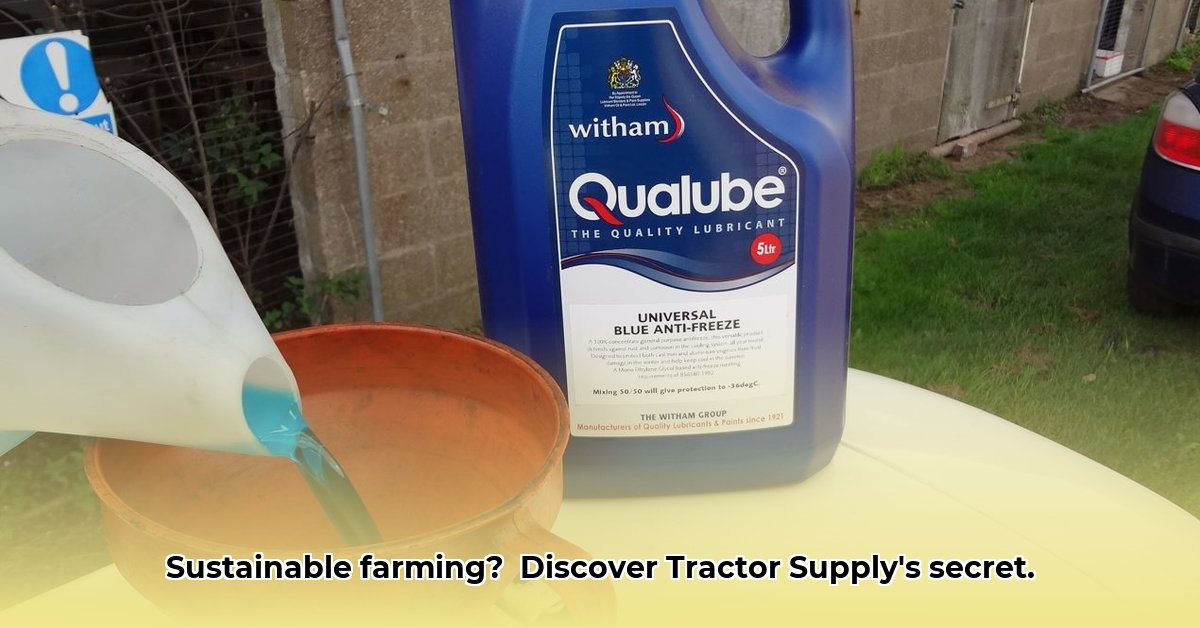
Tractor Supply Antifreeze: A Sustainable Choice for Modern Farms
Choosing the right antifreeze for your farm equipment is more than just a maintenance task; it's a small but significant step toward sustainable farming practices. Tractor Supply, among other retailers, offers a range of antifreeze options, and understanding these differences can significantly impact your farm's environmental footprint and your bottom line. Isn't optimizing both environmental responsibility and financial efficiency the ultimate goal? For more Tractor Supply resources, check out this helpful site.
Many farmers are unaware that traditional antifreeze formulations often contain chemicals harmful to the environment. Improper disposal contaminates soil and water sources, potentially harming wildlife and crops. However, a shift is underway towards more eco-conscious alternatives. The question isn't if we should adopt sustainable practices, but how we efficiently implement them within our existing workflows.
Navigating the Antifreeze Aisle: Eco-Friendly Options and Responsible Disposal
Fortunately, manufacturers are increasingly producing biodegradable and low-toxicity antifreezes. When selecting antifreeze at Tractor Supply or similar retailers, carefully examine product labels for terms like "biodegradable," "environmentally friendly," or "low-toxicity." Some manufacturers even provide detailed environmental impact assessments. Don't hesitate to ask store staff for guidance; their expertise can be incredibly valuable.
Beyond making informed purchasing decisions, responsible handling and disposal are paramount. Never pour used antifreeze down drains or onto the ground. This is a critical step, as improper disposal is a major source of environmental contamination. Instead, adhere to local regulations regarding proper disposal. Many communities offer recycling centers or hazardous waste facilities specifically for antifreeze. Contact your local government or waste management company to learn about disposal options in your area. This proactive approach not only protects the environment but helps prevent costly fines associated with illegal dumping of hazardous materials.
Maximizing Antifreeze Lifespan: Proactive Maintenance
Regular maintenance significantly extends antifreeze lifespan, reducing consumption and environmental impact. Regularly checking coolant levels prevents leaks and maintains optimal engine temperatures, prolonging antifreeze's useful life. A simple visual check during routine fueling significantly reduces the need for frequent replacements. This is a small, easily integrated practice with substantial long-term benefits for both your budget and the environment. This simple act of preventative maintenance can save you money and reduce your environmental impact.
Extended-Life Coolants: A Longer-Lasting Solution?
Extended-life coolants offer another avenue for sustainability. These coolants are designed to last longer than traditional antifreezes, decreasing the frequency of replacements and reducing waste. However, always verify compatibility with your tractor's engine type and model by consulting your owner's manual or your equipment dealer. This ensures both optimal performance and avoids potential damage to your equipment.
Dr. Emily Carter, Professor of Chemical and Biomolecular Engineering at Princeton University, emphasizes this point: "Choosing the right antifreeze and following proper disposal procedures are simple yet crucial steps in minimizing the environmental impact of agricultural operations. Every small change adds up to make a significant difference.”
Sustainable Farming: Beyond Antifreeze
The choice of sustainable antifreeze is just one element of a broader sustainable farming strategy. A holistic approach encompasses numerous practices:
Water Conservation: Implementing efficient irrigation techniques (e.g., drip irrigation) dramatically reduces water waste, lowers costs, and protects water resources.
Soil Health Improvement: Practices like no-till farming, cover cropping, and crop rotation enhance soil fertility, reduce erosion, and improve crop yields, contributing to a more sustainable ecosystem.
Renewable Energy Sources: Utilizing solar or wind power for farm equipment minimizes reliance on fossil fuels, reduces energy costs, and significantly lowers greenhouse gas emissions.
Integrated Pest Management (IPM): Emphasizing preventive measures and employing biological controls minimizes pesticide use, protecting beneficial insects and biodiversity while reducing health risks for both humans and the environment.
These practices, combined with responsible antifreeze selection and disposal, build a more sustainable and resilient farm operation.
The Future of Sustainable Agriculture
Innovation in sustainable agriculture continues at a rapid pace. Researchers are constantly developing new techniques and technologies to minimize environmental impact. Keeping abreast of these developments through resources such as agricultural extension offices, journals, and reputable online sources enhances the effectiveness of your farming practices and contributes to a more sustainable future. Embracing innovative practices builds a more environmentally sound, economically stable, and socially responsible future for farming.